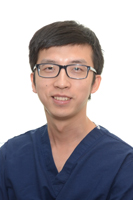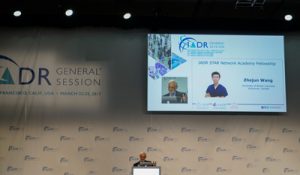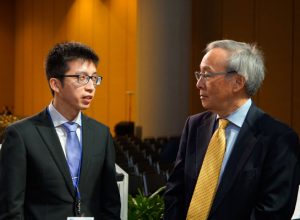
Dr. Zhejun Wang
2017-04-03
Zhejun Wang, a second-year graduate endodontics student, is the first ever recipient of the International Association for Dental Research (IADR) STAR Network Academy Fellowship. This new fellowship supports the awardee’s attendance at the IADR Academy and IADR General Session & Exhibition, and then to have a research experience in a renowned research laboratory.
Dr. Wang, who began his academics at UBC in 2010 as a visiting scholar and in 2012 as a postdoctoral fellow in the lab of Drs. Markus Haapasalo and Ya Shen before starting the graduate specialty program in endodontics in 2015, hails from Wuhan University, China. In 2011 he was a visiting scientist in the Cavendish Laboratory, University of Cambridge, United Kingdom, and in 2009 an exchange student at the School of Dentistry, Medical College of Georgia, in the United States. He has already over 50 publications, more than half of which were done at UBC.
“This fellowship is outstanding recognition of Zhejun and also for the research undertaken in the Haapasalo-Shen lab,” remarks Dr. Edward Putnins, professor and director of Research, Graduate & Post Graduate Studies at UBC Dentistry.

The winner of the IADR STAR Network Academy Fellowship is announced as Dr. Zhejun Wang, a second-year graduate endodontics student, at the IADR’s 95th General Session & Exhibition San Francisco, California, on March 24, 2017.
He is supervised by Dr. Markus Haapasalo, professor, and co-supervised by Dr. Ya Shen, associate professor, both in the Department of Oral Biological & Medical Sciences, Division of Endodontics. Wang garnered the fellowship based on his research background and achievements.
The fellowship enables Wang to visit the lab of Dr. Yvonne Kapila at the University of California, San Francisco, whose work has focused on understanding the basic extracellular matrix processes that govern head and neck cancer tumorigenesis and periodontal disease pathogenesis.
Wang will undertake research in oral microbiology; in this area, his special interests are oral biofilm inhibition, extracelluar polymeric substances formation, and antibiofilm material development such as antibiofilm peptide. He also has expertise in bioimaging techniques including flow cytometry, a biophysical technology often using lasers for cell counting and sorting, and biomarker detection.

Dr. Zhejun Wang (L) talks with Nobel Peace Prize winner Dr. Steven Chu (physics) who gave a keynote presentation after Wang’s award announcement on March 24, 2017, at the IADR’s 95th General Session & Exhibition San Francisco, California.
Moreover, the fellowship allows Wang to network with colleagues in the area of his own research, develop an understanding of contemporary research environments, learn new and innovative research techniques that can advance the science on his return to UBC, and develop shared research protocols and possible funding applications.
Wang received this fellowship on March 24, 2017, at the IADR’s 95th General Session & Exhibition San Francisco, California.